| Srl | Item |
| 1 |
ID:
146787
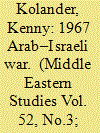

|
|
|
|
|
| Summary/Abstract |
This paper considers two aspects of historiography about the 1967 Arab–Israeli war – American and Soviet foreign policy in the region – to better appreciate the Soviet role in the outbreak of hostilities, as well as how the war concretized the USA–Israel ‘special relationship’ and weakened American–Arab relations. Relying especially on research from the Lyndon Johnson Presidential Library and Foreign Relations of the United States (FRUS), this paper argues that Soviet officials had little interest in pursuing measures to prevent war during the prewar crisis because the situation promised to undermine American interests in the region.
|
|
|
|
|
|
|
|
|
|
|
|
|
|
|
|
| 2 |
ID:
162451
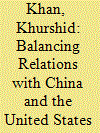

|
|
|
|
|
| Summary/Abstract |
It is always a risky affair, especially for a weak state to strike the right balance while
dealing with two great powers having serious conflicting interests in a particular
region. For a country like Pakistan which remains dependent on foreign aid, running
an independent foreign policy seems quite difficult. While Pakistan’s relations with
China continued to remain smooth throughout history, its relations with the United
States has been more of a roller coaster than a smooth ride but still both could never
be too apart from each other because of various compelling reasons. Currently,
China and Pakistan are extensively engaged in promoting their mutual economic
and strategic interests that go against the U.S. interests. Therefore, in the case of a
possible conflict between United States and China, Pakistan might be trapped in
a catch-22 because it cannot afford to infuriate the United States beyond certain
limits. In such a trap, staying neutral might be even riskier. Slow and steady change
in the status of Gilgit–Baltistan beyond a certain level for promotion of the China–
Pakistan Economic Corridor (CPEC) would also be a serious trap. Pakistan could
afford to lose economic benefits of the CPEC but it cannot afford to give up its
claim over Kashmir which remains the “lifeline” for its survival. Pakistani Generals
fighting on exterior fronts must therefore, make smart moves to ensure that at no
stage should Islamabad be compelled to put all its eggs in one basket.
|
|
|
|
|
|
|
|
|
|
|
|
|
|
|
|
| 3 |
ID:
162810
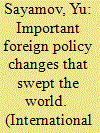

|
|
|
|
|
| Summary/Abstract |
FOR SEVERAL YEARS now, the world has been watching with a steadily growing concern how foreign policy changes are moving toward a global confrontation and how international relations are rapidly deteriorating with a threat of a "hot phase" on the horizon.
|
|
|
|
|
|
|
|
|
|
|
|
|
|
|
|
| 4 |
ID:
146782
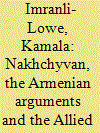

|
|
|
|
|
| Summary/Abstract |
The article explores the territorial conflict between Armenia and Azerbaijan over the Nakhchyvan region after the South Caucasus came under the Allied control following the Mudros Armistice of 30 October 1918. It analyses the arguments of the Armenian Government submitted to the Paris Peace Conference in 1919 to substantiate its vision of territorial delimitation between the two republics with regard to Nakhchyvan, examines the positions of Azerbaijan and Armenia and the Allied Powers on the Nakhchyvan problem and assesses the impact of their stance on the settlement of the issue. It argues that the Armenian claims to the region were land-related, being part of the Armenian nationalist aim of constructing an expanded Armenia from the Mediterranean to Garabagh. It also argues that the Allied Powers were guided by their own interests while making proposals on the settlement of the conflict.
|
|
|
|
|
|
|
|
|
|
|
|
|
|
|
|
| 5 |
ID:
169534
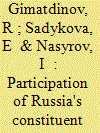

|
|
|
|
|
| Summary/Abstract |
BY THE END of the 20th century, foreign relations maintained by individual constituent territories of various countries had become a generally accepted element of the global political system. Practically ever since politicians and experts have been focusing their attention on the relationship between such contacts and Russia's foreign policy as the presence of individual Russian territories in the international arena was seen as a potential challenge to the centralized character of the country's foreign policy, to its security, and to its territorial integrity.1 Foreign contacts established by the administration of constituents regions of countries in seeking greater autonomy and solutions to regional political problems have been labeled "protodiplomacy."2
|
|
|
|
|
|
|
|
|
|
|
|
|
|
|
|